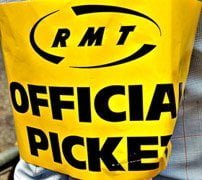The RMT has balloted more than 17,000 workers in a
dispute with Network Rail. The Union has been negotiating for months for the
harmonisation of terms and conditions for maintenance staff. Infrastructure workers voted 3 to 1 in favour
of strike action if necessary, though operations staff (such as signallers)
voted against a strike. The vote has brought Network Rail back to the
negotiating table. The talks are continuing.
Network Rail have failed to come up with a serious
offer to address the needs of 12,000 infrastructure workers, many of whom were
transferred to Network Rail from the private sector. The RMT demands for
infrastructure workers are for:
- Working week:
A 35 hour week with no loss of pay, moving toward a 34 hour week
with where possible a maximum 4 day rostered week over a 13 week cycle.
- Annual leave: 28
days annual leave on entry plus bank holidays.
30days after ten years service plus bank holidays. No compulsory working
on Christmas, Boxing and New Years days and agreed enhancements for working
those days.
- 39 weeks full sick pay.
- Pay issues: one grading system, one set of job descriptions, highest basic rates of
pay with allowances recognising that allowances can be reduced to increase basic
pay and 100% pensionable pay.
The company have been trying to use the
negotiations to drive down conditions instead of answering the Unions requests.
It became inevitable that a ballot would
have to take place and the workers threw out the companies offer by more than
one hundred to one against.
The balloting of the 5,000 signal grades
and other operational staff follows the rejection of a pay and conditions offer
that would in real terms mean cuts in living standards.
The offer of 4.8 percent this year and RPI plus 0.5 per for next year cent was
rejected as it would not protect staff against rising costs of fuel and other
commodities that are rising rapidly above inflation levels.
This offer was rejected by a margin of
two to one. The company then insultingly offered another tenth of one percent
on condition that we did not go to ballot.
With no sign of serious negotiations
from the company, a strike that could close down the entire network rail seems
inevitable.
This
would be one of the biggest actions that the country has seen since the late
eighties. The Union must get the message out to the general public and bring
them on board. The media are going to go into overdrive to run down the union’s
leadership and portray Railworkers as lazy and overpaid. We must do all that we
can to counter these lies and put the truth out on a constant basis. The left
should rally around this dispute and putting aside their differences, and give
as much support as possible.






